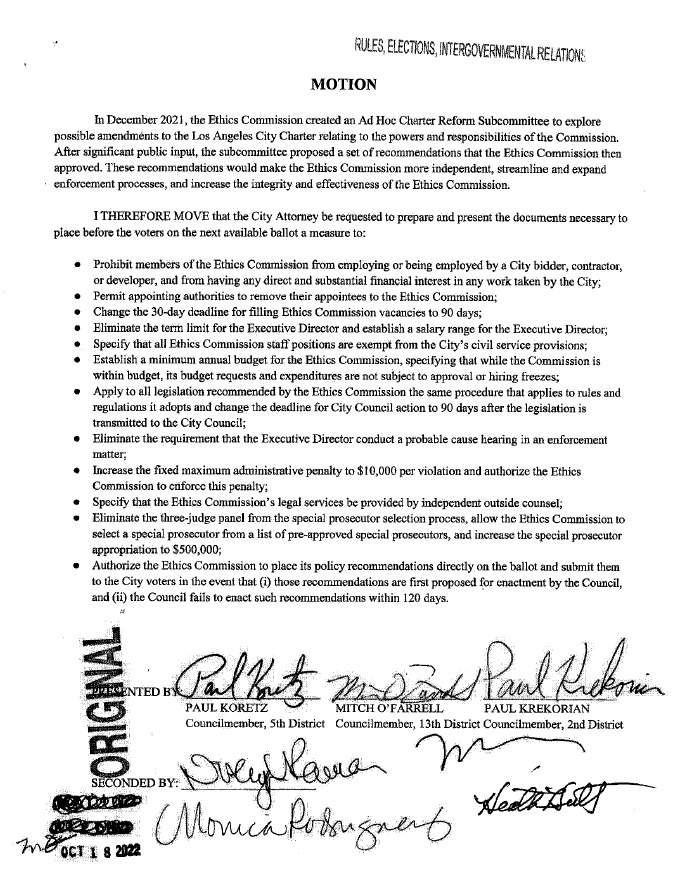CommentsLA GOVERNMENT - We have had a devastating week in the City of Los Angeles. One that has brought into sharp focus the reality that we need more accountability, transparency, and ethics from our elected officials.
On the bright side, there appears to be a growing consensus that we need to reform city government.
Los Angeles voters created the Los Angeles City Ethics Commission in the early 1990s in response to concerns about local corruption. Back then the Los Angeles Ethics Commission was one of the most progressive in the nation. Now, over 30 years later, the Ethics Commission is hampered by outdated laws, chronic underfunding, and at times questions as to its independence from those it regulates.
But this week, the light of reform began to flicker. Based on unanimous recommendations made by the Ethics Commission, seven Los Angeles City Councilmembers introduced a groundbreaking motion that could transform the Ethics Commission into one of the most independent and effective oversight agencies in the nation. This motion would allow the voters to increase the Ethics Commission’s independence and enhance its ability to do its important work.

Despite being one of the smallest and least funded departments in Los Angeles, the Ethics Commission oversees a broad range of critical programs. It shapes, advises on, and enforces laws regarding governmental ethics, campaign financing, and lobbying. It administers programs in each of those areas that foster transparency by requiring public disclosure of regulated individuals and organizations and their activities. Every year, the Ethics Commission processes over 20,000 public disclosure documents. The Commission has further enhanced transparency by developing an award winning online Public Data Portal containing a comprehensive ethics database.
The Ethics Commission manages the City’s matching funds program that helps a diverse range of candidates to run viable campaigns for local office. The Commission also investigates and enforces complaints. Since 2016, the Commission has assessed over $1.55 million in penalties for violations involving campaign contributions, misuse of City position, and undisclosed lobbying. Commission staff audits campaigns, provides advice, and conducts trainings to promote compliance. To administer these programs as effectively as possible, the Ethics Commission must be as independent as possible.
Under the current City Charter, the Ethics Commission does not have the authority to establish its own budget, update ethics laws, or obtain independent legal advice. Instead, the Commission must seek approval from the elected officials it regulates. Unlike other City departments, the Ethics Commission regulates and can bring enforcement actions against every official and employee in City Hall. This creates, at a minimum, the appearance of a conflict when the Ethics Commission must ask the very individuals it regulates to approve its core functions, budget, and recommendations for updates in City ethics law.
Without an independent budget, elected officials could easily interfere with the Ethics Commission’s ability to conduct its important work mandated by the voters. For example, the City Council could decide that it will refuse proper Commission funding, deny Commission budget requests, reject Commission staffing needs, or limit the amount spent by the Commission for enforcement.
Elected officials currently also have the sole authority to change the laws within the Ethics Commission’s jurisdiction. The City Charter requires the Commission to routinely assess the effectiveness of the ethics laws; but if changes are necessary, the only path forward requires the City Council to act. The City Council does not even have to hold hearings or vote on proposals from the Ethics Commission.
While many Ethics Commission legislative proposals are now the law, some proposals have been simply ignored. For example, the City Council did not even hold a hearing or vote on two prior proposals made in 2008 and 2018 by the Commission to reform the City’s outdated Municipal Lobbying Ordinance. A recent third Commission attempt to update the Lobbying Ordinance has yet to have any Council hearing. This can lead to the perception that paid lobbyists representing special interests wield more influence over City decisions than the public who asks for more transparent, representative government.
Another independence issue is legal advice. Under the City Charter, the Ethics Commission’s designated legal advisor is the City Attorney. However, this arrangement can create perceptions of conflicts. The Commission is responsible for regulating the City Attorney’s office. The City Attorney is also responsible for representing elected and appointed City officials regulated by the Commission.
The new City Council motion would allow the voters to decide whether to make the Commission more independent by approving the reforms proposed by the Ethics Commission. An Ethics Commission that has an independent budget, its own legal counsel, and the ability to place legislative proposals directly on the ballot would be better able to manage the City’s ethical challenges.
These recommended reforms would be new to Los Angeles, but they already exist in other jurisdictions. For example, the New York Campaign Finance Board establishes its own budget, the San Diego Ethics Commission has independent outside counsel, and the San Francisco Ethics Commission can place legislative proposals on the ballot.
Our Ethics Commission has done a tremendous job of creating transparency and promoting accountability in Los Angeles over the past 30 years. But all of us need a stronger, more independent Ethics Commission to move our City forward. Let the voters decide if they want a more independent Ethics Commission.
(Jeffery Daar, a native Angeleno, has practiced law since 1982 and is a principal in the law firm Daar & Newman. Daar has been previously appointed by three different Mayors of the City of Los Angeles to serve on other City commissions, including the Board of Airport Commissioners, the Rent Adjustment Commission, which he chaired for more than 10 years, and the Municipal Election Reform Commission. Currently, he is the President of the Los Angeles Ethics Commission.)

















